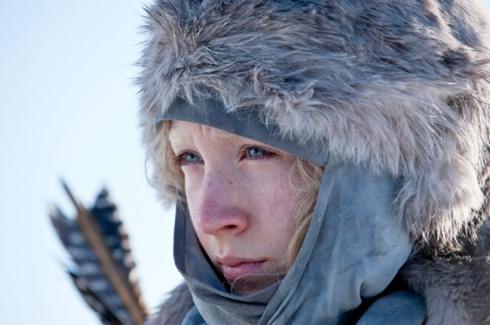Once upon a time, there was a girl who lived alone with her father in the middle of a forest. He taught her to hunt and to read and to cook and to shoot, and he told her that one day she would have to leave the forest and find the wicked witch who had sent them there. One day he gave her a magic box and told her, “If you open it, the witch will know where you are. You must only open the box when you are ready for her.” One day, when her father was out hunting, the girl opened the box…
Joe Wright’s film Hanna doesn’t start like this; it begins, instead, with a young woman stalking a deer across the ice. It might as well, though (and the trailer, which I swear hadn’t watched before writing this, does). Though it pretends to be an international spies-super-soldiers-and-suspense thriller, Hanna owes as much to fairy tales as to the grim, kinetic post-Bourne Identity action genre and to science fiction. And it’s a highly enjoyable ride besides.
Saoirse Ronan plays the title character, a sixteen-year-old raised in isolation by her German-born, ex-CIA father Erik (Eric Bana). He’s trained her to be the kind of highly skilled assassin who can take down an attacker who tries to shoot her in her sleep, and who can snap a human neck as readily as a rabbit’s. Her mission, we learn, is to attract the attention of CIA officer Marissa Wiegler (Cate Blanchett, dining out cheerfully and villainously on the scenery), allow herself to be captured, and kill Wiegler at her first opportunity, after which she will meet her father in Berlin.
Things don’t go quite according to plan, of course, and Hanna ends up on the run across Morocco and Spain, with Wiegler’s sadistic henchman Isaacs (a creepy, campy, and totally unrecognizable Tom Hollander) on her trail. She has a brief respite when she befriends the pop-culture-obsessed, impatient-to-grow-up daughter of a kind English family (Jessica Barden), but all roads lead to Berlin and to a final haunting confrontation with Wiegler in an abandoned amusement park, amid the decaying remains of fibreglass dinosaurs and rusting funfair rides.
The fairy-tale overtones and the near-feral child Hanna give the film a simultaneously trashy and refined European art-house feel, and sometimes you get the impression that the only action movies director Joe Wright (better known for film adaptations of Pride and Prejudice and Atonement) watched before signing on to this film were the Bourne films. There are punchy, breathless action scenes, usually where Hanna is doling out punishment to the bad guys and their drones in her father’s best style; and there are lovely moments rendered surreal by Hanna’s new-to-the-world perception: flamenco dancers in a Spanish gypsy camp; the English family singing happily along to David Bowie’s “Kooks” while Hanna watches from a hiding place inside their clapped-out hippie van. Throughout, you can’t take your eyes off the faces of the two extraordinary female antagonists—Ronan seems to have arrived from some alternate dimension, wide-eyed and leached of color; and Blanchett is as icy, menacing, and downright disturbing as any evil Disney queen.
In the end, you almost don’t notice the science-fiction elements of the tale. We learn that Hanna is the product of that time-honored staple of high-concept thrillers: a super-soldier breeding program. Marissa Wiegler was commissioned with shutting the program down and cleaning it up in classically ruthless film-CIA style, and Hanna and Eric slipped through the net. You may wonder why it took them so long to track down a valuable asset that very obviously escaped Wiegler’s mop-up; you might also wonder exactly how Erik acquired the transponder that Hanna uses to summon the CIA hellhounds that drag her from her childhood home. The film isn’t without logic holes, but you’d be hard pressed to find many films in this genre that don’t.
In the end, the sci-fi and cloak-and-dagger elements are as beside the point of the film as magic is in a fairy tale—it’s a means by which the story is driven, but if you let yourself get too wrapped up in it, you’ll get distracted. The real story lies in the tension between the parent and the child, and in the struggle to grow up in defiance of what one’s mother or father wants one to be.
Karin Kross has ambitions to be a supervillain, not a super-soldier. For now she lives and writes in Austin, TX.










